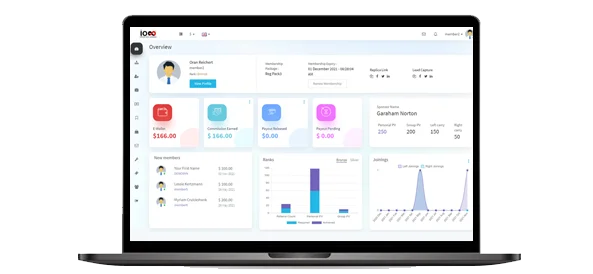According to recent studies, 90% of MLM businesses fail within their first year of operation. A staggering figure, isn’t it? But here’s the twist – among those that survive, a significant portion attributes their longevity to the key factors: analytics and reporting.
In the direct selling landscape, where decisions need to be swift and strategies adaptive, understanding your data is imperative. From tracking sales performance and customer behavior to optimizing compensation plans and identifying growth opportunities, analytics in MLM software serves as the compass guiding your journey through the competitive market terrain.
But let’s not overlook the role of reporting – a companion in this data-driven analytics. Reporting in MLM software empowers you to make informed decisions that drive growth and maximize profitability.
In this blog, we embark on an exploration of the relationship between analytics, reporting, and success in the realm of MLM software.
The Importance of Data in MLM
In the intricate web of multi level marketing, data serves as the cornerstone upon which successful strategies are built and sustained. Analytics in MLM software provide a bird’s-eye view of distributor performance, enabling you to identify top achievers, pinpoint areas for improvement, and cultivate a culture of excellence. By dissecting metrics such as sales volume, recruitment rates, and retention rates, you can identify patterns and trends that illuminate the path to success.
Another aspect which is crucial in staying ahead of the curve is reporting. Reporting offers invaluable insights into sales trends, product performance, and customer behavior.
With the power of reporting tools, you can analyze sales data with precision, identify best selling products, forecast demand, and tailor your offerings to meet the evolving needs of your target audience. Moreover, by knowing customer behavior such as purchase history, browsing patterns, and engagement metrics, you can personalize marketing campaigns, enhance customer satisfaction, and foster long-term loyalty.
Advanced Analytics and Reporting in MLM Software
In multi-level marketing, success hinges on data-driven strategies, and having access to advanced analytics and reporting capabilities is of course a game-changer. Modern MLM software is not just a platform for managing transactions; it’s a powerhouse of insights, equipped with sophisticated tools that offer a comprehensive view of your business operations.
From analyzing purchase history to tracking customer feedback and engagement metrics, these tools enable businesses to tailor their offerings. By leveraging these insights, MLM entrepreneurs can build stronger relationships, drive repeat sales, and explore new avenues for growth.
Making Informed Decisions with Data
Through advanced analytics and comprehensive reporting tools within MLM software, entrepreneurs gain access to a wealth of insights that serve as the compass guiding their journey towards success.
 Insights through Analytics
Insights through Analytics
Analytics in MLM software act as a beacon of growth and prosperity. Armed with this knowledge, they can identify trends, spot opportunities, and address challenges with precision and confidence.
 The Power of Reporting
The Power of Reporting
Reporting in MLM software complements analytics by offering an overall view of business operations and performance metrics. Reporting tools empower entrepreneurs to monitor progress, track goals, and measure success in real-time.
 Distributor Performance Tracking
Distributor Performance Tracking
By tracking individual distributor performance, MLM businesses can identify top performers, nurture emerging talent, and provide targeted support to those in need. Moreover, businesses can also optimize compensation plans and refine training programs.
 Sales Trend Analysis
Sales Trend Analysis
Advanced reporting tools within MLM software empower entrepreneurs to identify sales patterns, track growth over time, and forecast future performance with confidence, offering insights that drive informed decision-making and strategic planning.
 The Imperative of Data-Driven Decision Making
The Imperative of Data-Driven Decision Making
By leveraging the insights gleaned from analytics and reporting, entrepreneurs can make smarter, more informed decisions that drive long-term success and sustainability. From optimizing marketing strategies to refining compensation plans, MLM businesses rely heavily on using data to make informed decisions across all areas of operation.
 Customer Behavior Insights
Customer Behavior Insights
Advanced analytics and reporting in MLM software offer a window into the minds of customers, providing actionable insights that fuel targeted marketing efforts, enhance customer satisfaction, and drive long-term loyalty.
By adopting this method, business owners can find areas for improvement, use resources wisely, and plan for long-term success and profit in a competitive market. By using data-driven insights, entrepreneurs in MLM can navigate challenges, seize opportunities, and discover new ways to prosper in the MLM industry.
Ensuring Transparency and Building Trust in MLM
In MLM, where trust and transparency are the bedrock of successful distributor relationships, leveraging analytics and reporting plays a pivotal role in fostering an environment of openness and integrity. Let’s break down how comprehensive reporting can achieve this goal:
1. Clear Performance Data Access
- Comprehensive reporting tools provide distributors with access to clear and concise performance data, ranging from sales figures to recruitment metrics.
- Distributors can view their performance in real-time, enabling them to track their progress and identify areas for improvement.
2. Empowerment through Information
- By empowering distributors with access to transparent data, MLM organizations demonstrate a commitment to honesty and fairness.
- Distributors feel motivated to make informed decisions about their businesses, knowing that they have access to accurate and up-to-date information.
3. Building Trust Through Transparency
- Transparent reporting builds trust between MLM companies and their distributors by fostering a culture of openness and accountability.
- When distributors can see exactly how their efforts translate into results, they are more likely to trust the integrity of the MLM business model.
4. Enhancing Communication and Collaboration
- Clear reporting facilitates open communication between MLM organizations and their distributors, fostering collaboration and teamwork.
- Distributors feel valued and respected when they are kept informed about their performance and contributions to the organization.
5. Mitigating Misunderstandings and Disputes
- Transparent reporting helps to mitigate misunderstandings and disputes by providing a clear and objective view of performance metrics.
- When everyone has access to the same data, there is less room for confusion or misinterpretation.
Implementing Data Security and Compliance Measures in MLM Software Analytics and Reporting

1. Encryption and Access Controls
Implementing robust encryption mechanisms ensures that sensitive data is protected both in storage and during transmission, safeguarding it from unauthorized access or interception. Additionally, enforcing strict access controls limits data access to authorized persons only, reducing the risk of insider threats or unauthorized data breaches. By utilizing role-based permissions and implementing multi-factor authentication where applicable, MLM organizations can enhance data security and control access to critical information effectively.

2. Data Minimization and Retention Policies
Adopting data minimization practices involves collecting only the necessary information required for analytics and reporting purposes, reducing the potential attack surface and minimizing the risk of data exposure. Establishing clear data retention policies ensures that data is retained only for as long as necessary, adhering to regulatory requirements. By implementing these policies, MLM organizations can streamline data management processes and reduce the impact of data breaches or compliance violations.

3. Compliance with Regulatory Standards
Staying compliant with regulatory standards such as GDPR, CCPA, and HIPAA is essential for maintaining the trust of customers and stakeholders. MLM organizations must ensure that their analytics and reporting practices align with these regulations, including obtaining consent for data collection, providing transparency about data usage, and facilitating data subject rights requests. By adhering to regulatory requirements, direct sales companies demonstrate their commitment to data privacy and protection and mitigate the risk of regulatory fines or penalties.

4. Regular Audits and Assessments
Conducting regular audits and assessments of data security and compliance measures allows MLM companies to identify vulnerabilities and gaps in their systems and processes proactively. Collaborating with internal teams to evaluate adherence to established policies and procedures helps identify potential security risks or compliance issues. By conducting regular audits and assessments, MLM organizations can continuously improve their data security posture and ensure ongoing compliance with regulatory requirements.

5. Employee Training and Awareness
Providing comprehensive training programs to educate dstributors about their roles and responsibilities in safeguarding data is crucial for fostering a culture of data security awareness within the organization. By promoting best practices, such as password hygiene, data encryption, and secure communication protocols, MLM organizations can empower employees to recognize and mitigate potential security risks effectively. Additionally, conducting phishing simulations and encouraging employees to report security incidents or breaches enhances overall security awareness.

6. Vendor Due Diligence
Conducting thorough due diligence when selecting third-party vendors for analytics and reporting solutions is essential for ensuring that they adhere to data security and compliance standards. MLM companies should obtain assurances through contractual agreements and vendor assessments regarding the vendor’s data handling practices, security measures, and compliance with relevant regulations.

7. Incident Response and Contingency Planning
Developing a robust incident response plan outlining procedures for detecting, responding to, and mitigating data security incidents or breaches is critical for minimizing the impact of security incidents. Establishing clear communication channels and escalation protocols ensures timely and effective response actions, helping to contain and remediate security incidents quickly. MLM organizations can strengthen their overall security posture and resilience to cyber threats.
The Future of Analytics in MLM Software
In the ever-evolving landscape, without embracing cutting-edge technologies, staying ahead is a big challenge.. As we peer into the future of MLM software, it’s evident that analytics will play a pivotal role in driving innovation, efficiency, and growth. Let’s explore some key features that are shaping the future of analytics in MLM software:
 Integration with AI and Machine Learning
Integration with AI and Machine Learning
The integration of artificial intelligence (AI) and machine learning (ML) into MLM software represents a seismic shift in how data is analyzed, interpreted, and acted upon. AI-powered algorithms can sift through vast amounts of data, identifying patterns, trends, and anomalies that may elude human analysis. By leveraging AI and ML, MLM companies can gain deeper insights into distributor behavior, customer preferences, and market trends, enabling them to optimize strategies, personalize experiences, and drive targeted actions.
 Real-time Collaborative Analytics
Real-time Collaborative Analytics
Real-time collaborative analytics empower MLM teams to make use of the collective wisdom of their distributed workforce, fostering collaboration, knowledge sharing, and collective problem-solving. Through cloud-based platforms and collaborative tools, distributors can collaborate in real-time, sharing insights, discussing strategies, and co-creating solutions to common challenges. This real-time collaboration enhances communication and teamwork and accelerates decision-making processes.
 Enhanced Visualization Tools
Enhanced Visualization Tools
Enhanced visualization tools within MLM software empower users to transform raw data into visually compelling dashboards, charts, and graphs that facilitate understanding and drive informed decision-making. From interactive heatmaps and trend analyses to customizable dashboards and predictive modeling, these visualization tools enable users to explore data intuitively, uncover hidden patterns, and communicate insights effectively across the organization.
As we embark on this journey into the future of analytics in MLM software, one thing is clear: the possibilities are limitless. By embracing integration with AI and machine learning, real-time collaborative analytics, and leveraging enhanced visualization tools, MLM organizations can discover new opportunities, drive innovation, and chart towards sustained success in an increasingly competitive marketplace.
In Conclusion
In the fast-changing world of multi-level marketing, where success comes from the ability to adapt, innovate, and thrive, analytics and reports are crucial. They help businesses make smart choices based on data, improve plans, and find new ways to grow. Together, analytics and reporting form the backbone of a data-driven approach to MLM, enabling businesses to navigate challenges, seize opportunities, and achieve long-term success.
Frequently Asked Questions
In the fast-changing world of multi-level marketing, where success comes from the ability to adapt, innovate, and thrive, analytics and reports are crucial. They help businesses make smart choices based on data, improve plans, and find new ways to grow.
Together, analytics and reporting form the backbone of a data-driven approach to MLM, enabling businesses to navigate challenges, seize opportunities, and achieve long-term success.








